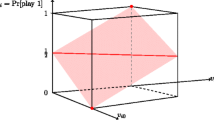Abstract
In large anonymous games, payoffs are determined by strategy distributions rather than strategy profiles. If half the players choose a strategy a, all of them get a certain payoff, whereas if only one-third of the players choose that strategy, the players choosing may get a different payoff. Strategizing in such a game by a player involves reasoning about not who does what but what fraction of the population makes the same choice as that player.
We present a simple modal logic to reason about such strategization in large games. Since actual numbers are irrelevant, a player need not even know how many others are in the game, thus leading to the consideration of games with unboundedly many players. The logic we consider is the propositional modal fragment of a first order modal logic. We show that it has a bounded agent property, giving us a decision procedure for satisfiability. We also present a complete axiomatization of the valid formulas. The logic admits a natural model checking algorithm and bisimulation characterization. The logic with quantification over players is more appropriate, but is undecidable.
Access this chapter
Tax calculation will be finalised at checkout
Purchases are for personal use only
Similar content being viewed by others
References
Angluin, D., Aspnes, J., Eisenstat, D., Ruppert, E.: The computational power of population protocols. Distrib. Comput. 20(4), 279–304 (2007). https://doi.org/10.1007/s00446-007-0040-2
Alur, R., Henzinger, T.A., Kupferman, O.: Alternating-time temporal logic. J. ACM 49(5), 672–713 (2002)
Banerjee, A.V.: A simple model of herd behaviour. Q. J. Econ. 107(3), 797–817 (1992)
van Benthem, J.: In praise of strategies. In: van Eijck, J., Verbrugge, R. (eds.) Foundations of Social Software, Studies in Logic, pp. 283–317. College Publications (2007)
Brandt, F., Fischer, F., Holzer, M.: Symmetries and the complexity of pure Nash equilibrium. J. Comput. Syst. Sci. 75(3), 163–177 (2009)
Blonski, M.: Anonymous games with binary actions. Games Econ. Behav. 28, 171–180 (1999)
Blonski, M.: Characterisation of pure strategy equilibria in finite anonymous games. J. Math. Econ. 34, 225–233 (2000)
Bonano, G.: Branching time logic, perfect information games and backward induction. Games Econ. Behav. 36(1), 57–73 (2001)
Christoff, Z., Hansen, J.U.: A logic for diffusion in social networks. J. Appl. Log. 13(1), 48–77 (2015)
Daskalakis, C., Papadimitriou, C.H.: Computing equilibria in anonymous games. In: Proceedings of the 48th Symposium on Foundations of Computer Science (FOCS), pp. 83–93. IEEE Computer Society Press (2007)
Das, R., Ramanujam, R.: A logical description of strategizing in social network games. In: Proceedings of the First International Workshop on Logics for New-Generation Artificial Intelligence, pp. 111–123 (2021)
Elkind, E., Faliszewski, P., Skowron, P., Slinko, A.: Properties of multiwinner voting rules. Soc. Choice Welf. 48(3), 599–632 (2017). https://doi.org/10.1007/s00355-017-1026-z
Ghosh, S.: Strategies made explicit in dynamic game logic. In: Proceedings of the Workshop on Logic and Intelligent Interaction, ESSLLI 2008, pp. 74–81 (2008)
Ghosh, S., Ramanujam, R.: Strategies in games: a logic-automata study. In: Bezhanishvili, N., Goranko, V. (eds.) ESSLLI 2010-2011. LNCS, vol. 7388, pp. 110–159. Springer, Heidelberg (2012). https://doi.org/10.1007/978-3-642-31485-8_4
Harrenstein, P., van der Hoek, W., Meyer, J.-J., Witteven, C.: A modal characterisation of Nash equilibrium. Fund. Inform. 57(2–4), 281–321 (2003)
Kalai, E.: Partially-specified large games. In: Deng, X., Ye, Y. (eds.) WINE 2005. LNCS, vol. 3828, pp. 3–13. Springer, Heidelberg (2005). https://doi.org/10.1007/11600930_2
Kempe, D., Kleinberg, J., Tardos, É.: Maximizing the spread of influence through a social network. Theory Comput. 11(4), 105–147 (2015)
Kozen, D., Parikh, R.: An elementary proof of the completeness of PDL. Theor. Comput. Sci. 14(1), 113–118 (1981)
Mossel, E., Neeman, J., Tamuz, O.: Majority dynamics and aggregation of information in social networks. Auton. Agents Multi-Agent Syst. 28(3), 408–429 (2013). https://doi.org/10.1007/s10458-013-9230-4
Padmanabha, A.: Propositional term modal logic. Ph.D. thesis, Institute of Mathematical Sciences, Homi Bhabha National Institute (2020). https://www.imsc.res.in/xmlui/handle/123456789/452
Parikh, R.: The logic of games and its applications. Ann. Discrete Math. 24, 111–140 (1985)
Paul, S., Ramanujam, R.: Dynamics of choice restriction in large games. IGTR 15(4) (2013)
Paul, S., Ramanujam, R.: Subgames within large games and the heuristic of imitation. Stud. Logica. 102(2), 361–388 (2014). https://doi.org/10.1007/s11225-014-9549-0
Padmanabha, A., Ramanujam, R.: The monodic fragment of propositional term modal logic. Stud. Logica. 107(3), 533–557 (2019). https://doi.org/10.1007/s11225-018-9784-x
Ramanujam, R., Simon, S.: A logical structure for strategies. In: Logic and the Foundations of Game and Decision Theory (LOFT 7), Volume 3 of Texts in Logic and Games, pp. 183–208. Amsterdam University Press (2008)
Simon, S., Apt, K.R.: Social network games. J. Log. Comput. 25(1), 207–242 (2015)
van der Hoek, W., Jamroga, W., Wooldridge, M.: A logic for strategic reasoning. In: Proceedings of the Fourth International Joint Conference on Autonomous Agents and Multi-Agent Systems, pp. 157–164 (2005)
Weibull, J.W.: Evolutionary Game Theory. MIT Press, Cambridge (1997)
Author information
Authors and Affiliations
Corresponding author
Editor information
Editors and Affiliations
Rights and permissions
Copyright information
© 2021 Springer Nature Switzerland AG
About this paper
Cite this paper
Das, R., Padmanabha, A., Ramanujam, R. (2021). Reasoning in Large Games with Unboundedly Many Players. In: Ghosh, S., Icard, T. (eds) Logic, Rationality, and Interaction. LORI 2021. Lecture Notes in Computer Science(), vol 13039. Springer, Cham. https://doi.org/10.1007/978-3-030-88708-7_4
Download citation
DOI: https://doi.org/10.1007/978-3-030-88708-7_4
Published:
Publisher Name: Springer, Cham
Print ISBN: 978-3-030-88707-0
Online ISBN: 978-3-030-88708-7
eBook Packages: Religion and PhilosophyPhilosophy and Religion (R0)




